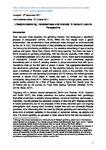Lifestyle gambling, indebtedness and anxiety: A deviant leisure perspective
| dc.contributor.author | Raymen, Thomas | |
| dc.contributor.author | Smith, Oliver | |
| dc.date.accessioned | 2017-11-21T22:37:56Z | |
| dc.date.available | 2017-11-21T22:37:56Z | |
| dc.date.issued | 2020-11 | |
| dc.identifier.issn | 1469-5405 | |
| dc.identifier.issn | 1741-2900 | |
| dc.identifier.uri | http://hdl.handle.net/10026.1/10247 | |
| dc.description.abstract |
<jats:p>While once subject to wide-ranging state control, gambling has successfully culturally embedded itself within the normalised and legitimised forms of leisure such as the night-time economy, sports fandom and online forums of socialisation. Consequently, this article argues that existing research which conceptualises gambling as separate from everyday life is largely obsolete in the contemporary context. We argue here that gambling has become an integral feature of the wider masculine weekend leisure experience, intimately connected to an infantilised consumer identity that is peculiar to late-capitalism. This article, drawing upon ongoing ethnographic research among what we term ‘lifestyle gamblers’, utilises a deviant leisure perspective to problematise the myriad harms that emerge from this relationship, situated within a broader critique of consumerism and global capitalism. While social gambling is defended fiercely by the industry, this article argues that an identity-based culture of sports-betting that attaches fragile social and cultural capital to the allure of the gambling win encourages the chasing of losses and impulsive betting. Underscored by a culture of readily available and high-interest credit, we explore how gamblers in a technologically accelerated culture develop a pathological relationship to money as it becomes desublimated and loses its symbolic value. Such processes, exacerbated by the promise of consumer culture, have the potential to cast these young adults into a paralysing reality of indebtedness that is fraught with depression, stress, domestic instability and destructive behaviours of consumption.</jats:p> | |
| dc.format.extent | 381-399 | |
| dc.language | en | |
| dc.language.iso | en | |
| dc.publisher | SAGE Publications | |
| dc.subject | Gambling | |
| dc.subject | deviant leisure | |
| dc.subject | consumerism | |
| dc.subject | harm | |
| dc.subject | ultra realism | |
| dc.subject | cultural criminology | |
| dc.title | Lifestyle gambling, indebtedness and anxiety: A deviant leisure perspective | |
| dc.type | journal-article | |
| dc.type | Journal Article | |
| plymouth.author-url | https://www.webofscience.com/api/gateway?GWVersion=2&SrcApp=PARTNER_APP&SrcAuth=LinksAMR&KeyUT=WOS:000578037200001&DestLinkType=FullRecord&DestApp=ALL_WOS&UsrCustomerID=11bb513d99f797142bcfeffcc58ea008 | |
| plymouth.issue | 4 | |
| plymouth.volume | 20 | |
| plymouth.publication-status | Published | |
| plymouth.journal | Journal of Consumer Culture | |
| dc.identifier.doi | 10.1177/1469540517736559 | |
| plymouth.organisational-group | /Plymouth | |
| plymouth.organisational-group | /Plymouth/Faculty of Arts, Humanities and Business | |
| plymouth.organisational-group | /Plymouth/Faculty of Arts, Humanities and Business/School of Society and Culture | |
| plymouth.organisational-group | /Plymouth/REF 2021 Researchers by UoA | |
| plymouth.organisational-group | /Plymouth/REF 2021 Researchers by UoA/UoA18 Law | |
| plymouth.organisational-group | /Plymouth/Research Groups | |
| plymouth.organisational-group | /Plymouth/Research Groups/Institute of Health and Community | |
| plymouth.organisational-group | /Plymouth/Users by role | |
| plymouth.organisational-group | /Plymouth/Users by role/Academics | |
| dcterms.dateAccepted | 2017-09-15 | |
| dc.identifier.eissn | 1741-2900 | |
| dc.rights.embargoperiod | Not known | |
| rioxxterms.versionofrecord | 10.1177/1469540517736559 | |
| rioxxterms.licenseref.uri | http://www.rioxx.net/licenses/all-rights-reserved | |
| rioxxterms.licenseref.startdate | 2020-11 | |
| rioxxterms.type | Journal Article/Review |


